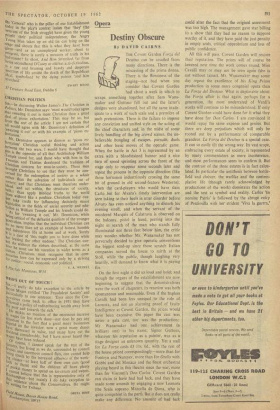SI R- - In discussing Walter James's The Christian in Politics, Mr. Denniston
says: most would today agree that sweating it out is more Christian than a great
deal of pious exhortation.' This may be so, but from the rest of the article I am not certain that
all would agree with Mr. Denniston's definition of sweating it out' or with his example of 'pious ex- hortation.. Mr. Denniston appears to dismiss as 'pious ex- hortation' Christian social thinking and action
between the two wars. I would have thought that this is the opposite of all that Archbishop William Temple stood for, and those who with him in the Twenties and Thirties developed the tradition of Christian concern for man-in-society. These men brought Christians to see that they must be con- cerned for the redemption
rather of society as a whole than the salvation of individuals out of :oeiety; and that Christians must therefore under- (caPd• and act within, the structures of society, from without than apply Biblical truths to the world without like a poultice. Christians today can- ;1m take credit for influencing decisively major gislation in the fields of social security and edu- cation as William Temple and his friends could do. b s for 'sweating it out,' Mr. Denniston, while generation critical of the defeatist quietism of the younger generation implies that the individual Christian can more than set an example of honest, humble it'‘`. industrious life at home and at work. Surely
a case of 'this ought you to have done while
""( leaving the other undone.' The Christian can- not
do without the virtues described; at the same time citizen Christians must see his vocation in wider terms as a
'n. Christians must recognise that in corn- 71r 'nities love can be expressed only by a striving justice--social, economic and political.














































 Previous page
Previous page